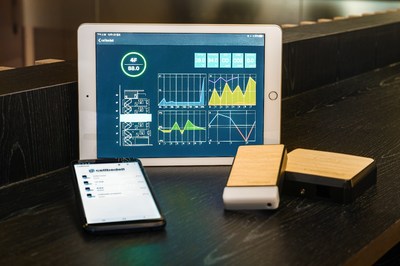LAS VEGAS, Jan. 9, 2020 /PRNewswire/ -- Nestech and other notable homegrown startups led by Taiwan Tech Arena (TTA) are now showcasing their innovative solutions at CES 2020.

With the advent of the smart city, the biggest challenge will be how to apply intelligent management systems to various company operations. In order to help small and medium-sized hotels and businesses conserve human resources, the startup company Nestech has launched a smart access control and unmanned reception system. It is a simple visual system that replaces conventional cumbersome methods, improving the flexibility of company management.
Founded in 2013, Nestech is an ICT developer specializing in IoT software and hardware integration. To optimize front desk management for hotel bookings, Nestech launched the CellBedell smart access control and unmanned reception system in 2017. It is a system solution that provides greater convenience for small and medium-sized hotel management.
The administrator needs only to download the app to send the password to the registrant and set it to automatically expire on the day of checkout, which will economize manpower. With edge and cloud computing, CellBedell can also be used in offline mode. Since CellBedell does not require cabling, small in size and has an edge on price, it is extremely popular in the hotel industry across Southeast Asia.
Nestech has recently added a smart disaster prevention function to CellBedell. With the built-in sensor that detects temperature, humidity, smoke, and gas, CellBedell can signal the status behind every door as soon as a fire starts. Jia-Jia Yeh, the co-founder of Nestech, points out that there are approximately 3 to 5 doors on every floor of a regular building. In the past, the method was to sense the temperature of doorknobs and assess smoke conditions, which shortens the escape time. The status inside the room can now be visualized by CellBedell's signals, increasing the chances of escape at the golden hour.
In addition to increasing escape efficiency, CellBedell's disaster prevention system can also provide early warnings. By determining the safety factors of the rooms, the system's sensors can monitor each area in real-time and notify the administrator at the onset of a disaster. Jia-Jia Yeh says it is like the "brain" of the building, a system that can regulate the overall safety.
In concert with the government's promotion of 5G, Nestech will work with FarEasTone and Qualcomm in the coming year to conduct field verification for the smart disaster prevention system at Central Taiwan Science Park, AI Robotics Hub, and Hsinchu American School. Should fundraising and team expansion be successful, Nestech will venture into B2C applications to build an even more convenient and secure smart living experience.
SOURCE Taiwan Tech Arena

